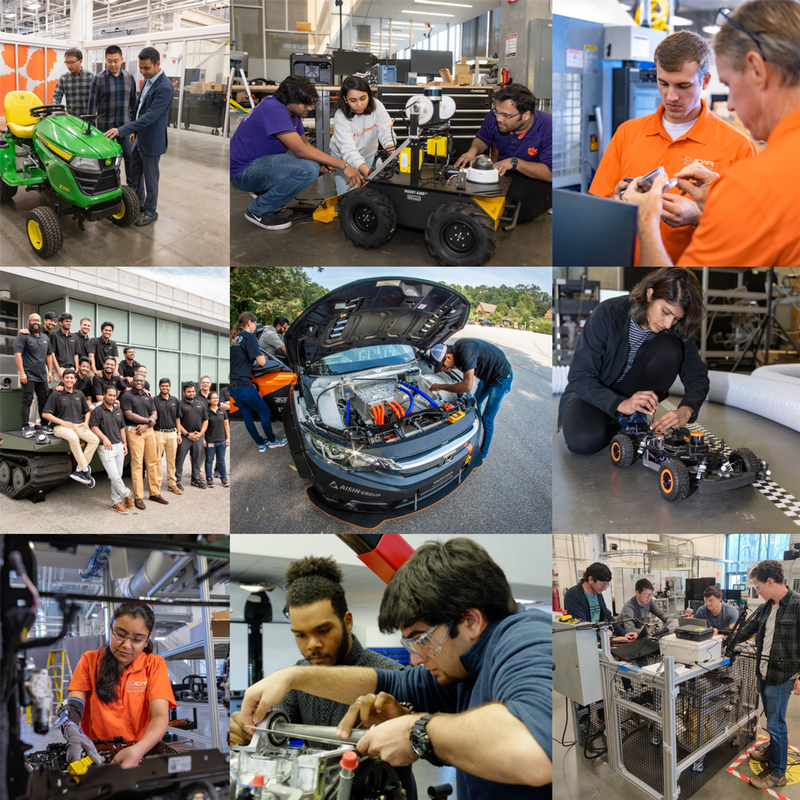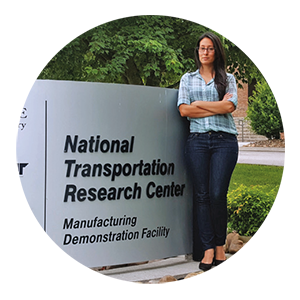
CU-ICAR is an advanced research campus where education, research and corporate engagement create a global venue for public/private partnerships. Our internationally recognized $250 million campus was developed in collaboration with BMW, Michelin, Timken, and the state of South Carolina. The campus includes full-scale automotive testing equipment, graduate education programs in automotive engineering and facilities that bring industry and Clemson University researchers together to provide solutions for sustainable mobility.
Focus Areas
We continuously analyze the market and survey industry leaders to identify future trends and R&D focus. Based on this knowledge, our research clusters and “technology identity” are centered in five research areas.
-
Advanced Vehicle Propulsion Systems
Propulsion system architectures, including hybrid electric systems and simulation-based methods for optimization of design and operating strategy, advanced IC engine concepts and control, emissions after treatment modeling and control, alternative fuels, heat transfer and low-heat rejection, energy storage systems, power electronics, battery aging and management systems along with the vehicle to grid interaction, model-based powertrain control and algorithms for improving energy efficiency using vehicle connectivity.
Advance Powertrain ResearchPrimary Contact
Zoran Filipi
Chair & Executive Director
zfilipi@clemson.edu -
Advanced Manufacturing & Materials
Research that focuses on the digitization of manufacturing systems, vehicle assembly, automation and human-robot interaction, data analytics and predictive maintenance, continuous process improvement, sustainable manufacturing and advanced materials, metal and non-metal, characterization, processing, and manufacturing.
Manufacturing & Materials ResearchPrimary Contact
Laine Mears
SmartState Endowed Professor of Automotive Manufacturing
mears@clemson.edu -
Design & Integration of Complex Systems
An interdisciplinary, collaborative engineering-and-management approach that produces an integrated solution that satisfies all customer needs. Modeling and simulation tools for full-vehicle prototyping and agile trade space exploration by combining efficient optimization and rapid analysis. Agile physical prototyping of innovative vehicle concepts.
Systems Integration ResearchPrimary Contact
Chris Paredis
Chair
paredis@clemson.edu -
Connected & Automated Vehicles
Lifecycle treatment (design, analysis, prototyping, validation, operation, and end-of-life) of multi-scale distributed connected-autonomy systems-of-systems to enhance and empower mobility and improve energy efficiency and traffic flow. Application areas range from microcosms of Smart Cities such as manufacturing shop floors, malls, and hospitals to full-scale smart city settings.
Vehicular Electronics ResearchPrimary Contact
Venkat Krovi
Chair & Professor
vkrovi@clemson.edu -
Human Factors
Human Factors/HMI integrates multiple disciplines, including psychology, medicine, computer science and engineering, to maximize usability and user satisfaction with existing products and innovations.
Human Factors ResearchPrimary Contact
Johnell Brooks
Professor
jobrook@clemson.edu
The Department of Automotive Engineering encourages undergraduates to engage with their instructors for opportunities to work on research projects in their labs and participate in Creative Inquiries. Students in their senior year can participate in a project that mirrors the Master’s level, Deep Orange. Deep Orange is a vehicle prototype program that provides an exceptional educational experience with extensive industry collaboration during the M.S. degree program in automotive engineering.
Within the graduate program, our students develop sustainable mobility solutions balancing environmental, social and economic aspects. Each project incorporates breakthrough product innovations and new processes, providing each automotive engineering student with hands-on experience in vehicle design, engineering, prototyping and production. The degree programs emphasize engineering practice and the advancement of engineering knowledge through research.
“My research experience at CU-ICAR helped to increase my interest for new automotive technologies. At CU-ICAR, I worked to find new ways to optimize the energy consumption of hybrid-electric vehicles and develop eco-driving systems that help drivers improve their ‘green’ driving skills; these efforts aimed to reduce the amount of energy consumed by vehicles. Furthermore, I had the opportunity to work in cooperation with different research groups and professors and to share experiences with exceptional women who were also pursuing their graduate studies in the automotive field.”
Jackeline Rios-TorresAutomotive Engineering, Ph.D.


